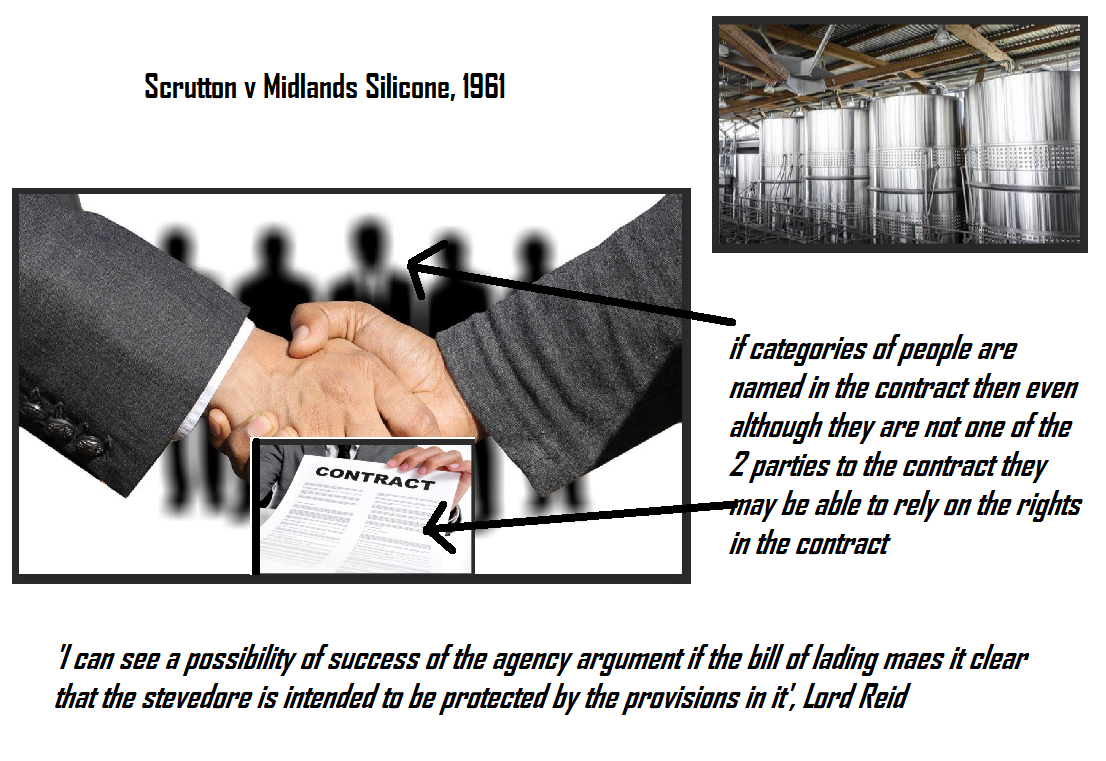Scruttons Ltd v Midland Silicones Ltd [1961] UKHL 4
Citation:Scruttons Ltd v Midland Silicones Ltd [1961] UKHL 4
Rule of thumb:If you are named in a contract, but not a party to it, can you enforce rights under it? Where a contract between 2 people clearly identifies another class of person, and gives them rights under the contract, then this other class of person can rely on the rights under the contract and sue under it.
Background facts:
The facts of this case were that Scrutton had paid for drums of manufacturing chemicals to be shipped by a shipping company from a port in America to a port in the UK. The contract was for the shiping company only to be shipped to the port and did not include them to load and unload them, which they affirmed by contract they were not taking liability for. When the boat arrived in the UK the shipping company used Midland Silicones to load and unload the drums. The drums were damaged by Silcone in the packing and unpacking process. Scuttons therefore sued the packers for the damage done to their goods in the packing process.
Parties argued:
Scruttons argued that the company had breached their duty to pack and unpack the boxes correctly. The packers accepted they had not fulfilled their duties correctly but had a clause with the shipping company who were not a party to the action which stated that liability was limited to $500 per box. They therefore refused to pay damages above this.
Judgment:
The Court affirmed that Scruttons were not a party to the contract between the packers and the shipping company so the term reducing liability did not apply to them. The Court ordered the packers to pay the full damages to Scrutton. The Court did affirm, however, that if the contract between Scrutton and the shipping company had mentioned this damages limitation clause for packers, then this would have been enforceable, but there was no mention of this in the contract, so it did not apply.
This seminal established an exception the principle of privity of contract. If a category of person is named under the contract then people in this contract can obtain the rights under despite not being one of the parties to it. Where there is an exception to the privity of contract principle like this it is called a jus quaesitum tertio.

Ratio-decidendi:
‘I can see a possibility of success of the agency argument if (first) the bill of lading makes it clear that the stevedore is intended to be protected by the provisions in it which limit liability, (secondly) the bill of lading makes it clear that the carrier, in addition to contracting for these provisions on his own behalf, is also contracting as agent for the stevedore that these provisions should apply to the stevedore, (thirdly) the carrier has authority from the stevedore to do that, or perhaps later ratification by the stevedore would suffice, and (fourthly) that any difficulties about consideration moving from the stevedore were overcome. And then to affect the consignee it would be necessary to show that the provisions of the Bills of Lading Act 1855 apply’, Lord Reid, ‘If the principle of jus quaesitum tertio is to be introduced into our law, it must be done by Parliament after a due consideration of its merits and demerits. I should not be prepared to give it my support without a greater knowledge than I at present possess of its operation in other systems of law’, Viscount Simmonds
'I can see a possibility of success of the agency argument if the bill of lading makes it clear that the stevedore is intended to be protected by the provisions in it', Lord Reid
Warning: This is not professional legal advice. This is not professional legal education advice. Please obtain professional guidance before embarking on any legal course of action. This is just an interpretation of a Judgment by persons of legal insight & varying levels of legal specialism, experience & expertise. Please read the Judgment yourself and form your own interpretation of it with professional assistance.

